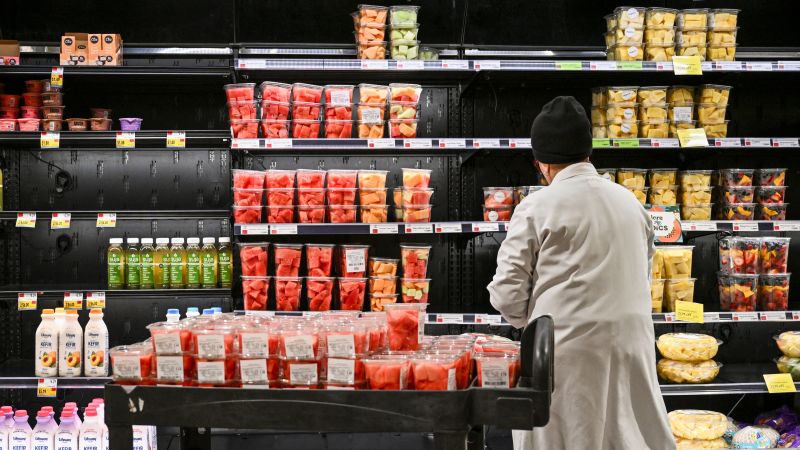CNN
—
Inflation slowed sharply in March, new data showed Thursday, underscoring the continued strength and resilience of the economy ahead of President Trump’s aggressive trade moves.
In any other timeline, such news would stoke optimism that Americans’ cost of living is no longer surging.
However, the latest reading of the Consumer Price Index — which showed inflation cooling to an annual rate of 2.4% in March — lands as countries, businesses, markets and consumers grapple with America’s most severe escalation of its tariff rate in more than a century.
Economists have cautioned that Thursday’s CPI report could very well mark the nadir in inflation this year as Trump’s massive and sweeping tariffs upend global order and make imports — and, likely, end-products for consumers — markedly more expensive.
In March, prices fell 0.1% from the month before, a slower pace of growth than the 0.2% gain recorded in February, according to Bureau of Labor Statistics data released Thursday.
It’s the first time that prices have fallen on a monthly basis since May 2020.
Economists were expecting that falling energy prices would drive down the overall CPI rate to 0.1% for the month and 2.6% for the year, according to FactSet.
The overall CPI index was driven lower by energy prices, which fell in part due to seasonal adjustments (prices typically go up in March but instead were muted due to growth and recession concerns).
At the grocery store, food prices shot higher, increasing 0.5% from February, when prices held flat.
Egg prices continued to climb for consumers as the industry still reels from a deadly bout of avian flu. The CPI egg index rose 5.9% from February and was up 60.4% annually.
While the US Department of Agriculture has indicated in recent postings that wholesale prices are starting to fall as the avian flu is getting more under control, those declines weren’t visible at the retail level last month.
Energy and food prices can be quite volatile, but Thursday’s report showed that underlying inflation cooled much more than economists expected.
Core CPI, which strips out food and energy, rose just 0.1% for the month, resulting in a rate of 2.8% for the 12 months ended in March, marking a sharp slowdown from 3.1% in February. Core CPI is at its lowest rate in nearly four years.
“The decline in core inflation in March will definitely be welcomed by the Fed, particularly as it was evident in both core goods and services components,” Brian Coulton, chief economist at Fitch Ratings, said in a statement. “But we know firms had been sucking in huge amounts of imports in January and February in advance of tariff hikes, so the shock to consumer goods prices from tariff hikes is not reflected yet.”
This story is developing and will be updated.


